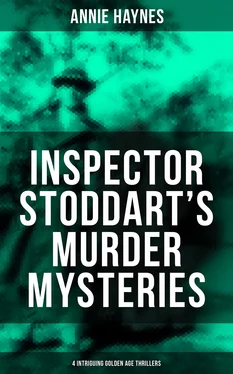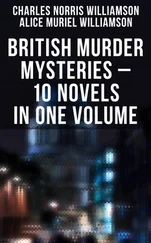"These little dots under the name Rendal."
"They don't look accidental," Harbord said slowly. "But what can they mean?"
"I should like to know," the inspector said, getting up.
Table of Contents
"Here we are! Neith Street," the inspector said, as he and Harbord turned into a busy and rather mean-looking street, "and there is Rendal's on the opposite side. Still sticks to his coloured jars, I see. Shouldn't say Neith Street was very modern."
The chemist came forward to meet them. It appeared to be a one man shop, small and stuffy, smelling strongly of drugs. The chemist also was small and bespectacled.
"Mr. Rendal?" the inspector said inquiringly.
"Certainly!" The chemist looked a trifle surprised. "Can I do anything for you, sir?"
The inspector handed him a card.
"It is just a little help I want, Mr. Rendal. Can you carry your mind back to last February,—the 27th of last February?"
The chemist turned his head away, looking at the card before answering, and paused a moment.
"Yes, I remember the 27th of last February."
"Will you tell me what fixes it in your memory?"
Again there was that odd hesitation.
"Well, that day, there was an accident a little lower down the street, a woman—a Mrs. Monnet—was knocked down and brought into my shop, where a doctor who was passing attended her."
"His name?" the inspector questioned abruptly.
"Dr. John Bastow! The same who was murdered a few days later." The chemist looked at the two men over the top of his glasses. "It was the same—I believe I have a card of his still. If you would not mind waiting a few minutes perhaps I could find it."
The inspector held up his hand.
"No matter. We know that it was that Dr. Bastow. Now I want you to tell me just what happened that day."
Mr. Rendal began more glibly this time.
"Well, Mrs. Monnet was carried into my little sitting-room and Dr. Bastow attended to her there. She was seriously but not dangerously injured, and in a little time her husband, who had been sent for, was able to move her to a nursing home. That is all that occurred that day."
"Did you see any more of Dr. Bastow?"
"Yes. He came in the next day. He had lost a memorandum-book, and he thought that in the confusion caused by the accident and the removal of Mrs. Monnet he might have laid it down and forgotten it. However, we had seen nothing of it, but as it was rather important we instituted a vigorous search. Dr. Bastow stopped in the shop and looked at my books, particularly the one in which I entered the sale of poisons. I do very little in this way, so my book went back for years, to long before the passing of the new poisons act. Dr. Bastow seemed very much interested in it."
"Ah, poisons! That would interest Dr. Bastow," the inspector said, taking out his notebook. "Now, Mr. Rendal, this may be of great importance. I need not warn a man of your position to be careful. Please tell me exactly what Dr. Bastow did and said with regard to your poison sale book?"
"He did nothing but turn the pages over," Rendal said, taking off his glasses and wiping them "He had almost reached the beginning when he came to the entry that arrested his attention. It recorded the purchase of a considerable quantity of arsenic, for gardening purposes, by a William Taylor. He had signed for it, of course, and Dr. Bastow seemed extraordinarily interested in his signature. He asked me to describe Mr. Taylor, and I did so to the best of my ability."
"Please tell us what this Taylor was like. How was it that you came to remember him after so long a time had elapsed?" the inspector questioned.
The chemist looked away from his interlocutor.
"Dr. Bastow asked me that. I can only tell you what I told him. Mr. William Taylor impressed me because he was so very unlike most of the people who come into the shop."
"Can you give me any sort of description?" the inspector went on.
Mr. Rendal coughed.
"Well, most of my customers are of the poorer class. It is very seldom that I get anyone like Mr. William Taylor, who was unmistakably a gentleman. That really fixed him in my mind. That and his good looks, for he really was good-looking—big and fair with a pleasant manner. I took quite a fancy to him. Dr. Bastow made me give his description over and over again."
"Should you know him if you saw him now?" the inspector questioned.
"Well, he must be a good deal altered. It is more than ten years ago." Mr. Rendal hesitated.
"Have you ever seen him since?"
"I am not sure—I think I have—a month or two later." Rendal was wiping the dew from his glasses; he did not look up.
"Where?"
"The Fleet Street end of the Strand," Rendal said uneasily.
"You are sure it was the same man?" There was an under-note of triumph in the inspector's voice that made Harbord look at him.
"No, not sure. I couldn't be. I was not near enough. But I think it was he."
"How old was he?"
"Between thirty and forty, I should think."
The chemist leaned on his counter and looked out at the passers-by. The thought struck Harbord that he would have been glad if one of them had been a customer and so made an interruption. But no one came into the little shop and the inspector pursued his inquiries.
"Have you any reason to think that this man, this customer, does not always go by the name of William Taylor?"
The chemist replaced his glasses and began to play with a box of patent pills on the counter, peeling bits of paper off absent-mindedly.
"Dr. Bastow said the writing was disguised. Naturally, that made me think a bit."
"Naturally!" Stoddart leaned over the counter till his head was very near the chemist's. "And have you ever thought you knew or guessed any other name William Taylor might be known by?"
Rendal began to tremble.
"I do not know anything, inspector. And as to guessing—well, I never heard that guessing was evidence. Guessing wrong might land a man in the Law Courts."
The inspector straightened himself.
"Quite right, Mr. Rendal. I am glad you are careful. Your identification of Mr. Taylor will be all the more valuable when you are called upon to make it, as you probably will be in the course of the next few weeks. You will please hold yourself in readiness. As for the entry in your book, I shall want that too."
The chemist made no rejoinder; his face had turned a curious grey tint, and he barely responded to the inspector's "Good morning" as the two detectives left the shop.
"Another step on the way," the inspector said as he hailed a taxi. "Still, there is a lot to be done if we are to save Wilton. But, however the trial ends, I will never stop till I have got the rope around the neck of the real criminal."
"Mrs. Carr's testimony appeared to clear Wilton of any complicity in Bastow's murder, and this of Rendal's should help," Harbord said thoughtfully. "Then Alice Downes says that she never saw the bag and the pistol at the flat."
"Quite," the inspector agreed. "But you have to recognize first that, even if Wilton were being tried for the murder of Bastow and Mrs. Carr were in the box, the fact that she is Mrs. Carr would considerably discount the value of her evidence. And she would be recognized at once—it would be impossible to keep her real name out of the papers. Secondly, Alice Downes's evidence in the Wilton case is merely negative. She didn't see the pistol or the bag in the flat. That does not prove that they were not there. She says herself that she seldom went into Wilton's room, and never saw the wardrobe door open. When Wilton was ill, Mrs. Wilton did all the waiting on him. That sort of thing won't help Wilton much. I had one bit of luck this morning, though. You know I have always been puzzled as to how the cloak-room ticket got into Wilton's pocket, in a coat which he swears he had not worn for months?"
Читать дальше












